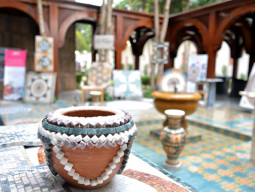
“I did not want to become a burden for my brother. This is why I started doing embroidery to earn a living,” said Hafeez. Whether it’s simple hand embroidery or crosia embroidery, Hafeez is an expert at it.
Belonging to Patti Kulyar near Musafir Khana which is 30 kilometers away from Bahawalpur, Hafeez designs bed sheets, pillow covers, cushion covers, sofa covers as well as covers for tables and trunks. She also knows how to create vase-covers with crosia embroidery.
Although she has been doing embroidery since a long time, the talented woman has not had the chance to cater to larger markets. “I need a lot of money in order to reach bigger marketplaces. Currently, I can sell my artwork in my village only,” shared Hafeez.
According to her, poverty is the reason to why she has not been able to promote her work on a larger scale.
After spending some years of fruitless effort, Hafeez found out about the loans being offered by Khushhali Bank Limited. She applied for a Rs20,000 loan and received it. “The loan has enabled me to create more embroidered items and earn more money.”
According to her, it takes a month to complete a bed sheet with pillow covers. “It is an investment of Rs6,000 to Rs6,500 on a bed sheet and pillow covers.”
She says that they can be sold for Rs15,000 if they get to the bigger markets. Five cushion covers in a set cost her Rs1,000 which can be sold for Rs3,000 in larger markets. It takes around two weeks for her to complete a set of cushion covers.
“The embroidered vase-covers are prepared in a week and cost me Rs700. They can be sold for Rs2,000,” shared Hafeez.
“I also make handbags which cost me Rs1,500 and can be sold for over Rs3,000.” Her nimble fingers take 20 days to prepare a Ralli, a traditional quilt made from different colored pieces of fabrics.
Hafeez wishes to request the government to support people in rural areas who are trying to earn a living with their craftwork. According to her, the government should give them loans and help them with exposure to both local and international markets.
A little help in form of a small loan has helped this self-respecting woman to support herself. This is what empowerment looks like.
Dyeing a better future
Since she was a child, she would create beautiful colourful pieces of chunri (traditional tie-dye) which women of her area bought and wore on special occasions. Little did she know that this skill would pull her through life.
This 35 years old resident of Abbas Nagar near Bahawalpur is an owner of a small business today, and is helping support her husband and four children lead a better life.
Khalida Mustaqeem’s family was in the chunri making business, therefore Khalida has been practicing it since her childhood. But she has “kept my children away from this work. I wish to see them seek education and get into better professions,” she shared.
At first, she was practicing this art on a very small scale due to lack of resources. Once she came to know about loans being offered by Khushhali Bank Limited, she acquired a loan of Rs25,000 and purchased more equipment in order to take more orders.
“It takes around two days for me to get one suit ready. It is hard work,” explained Khalida while talking to The Express Tribune. She purchases white fabric and ties it with thread multiple times at different positions. It then undergoes the dyeing process. “I sell a chunri suit for around Rs 600 to Rs1,000,” shared Khalida. “I receive orders for around Rs25,000 in a week and this brings me good money.”
Because of the demand of this craft, Khalida receives a lot of orders from all over Pakistan.
“Since I cannot meet the deadlines on my own, I have hired women to share the workload. I have created employment for women in my area who can only work from their homes.”
Published in The Express Tribune, March 19th, 2014.

























1714024018-0/ModiLara-(1)1714024018-0-270x192.webp)









COMMENTS
Comments are moderated and generally will be posted if they are on-topic and not abusive.
For more information, please see our Comments FAQ